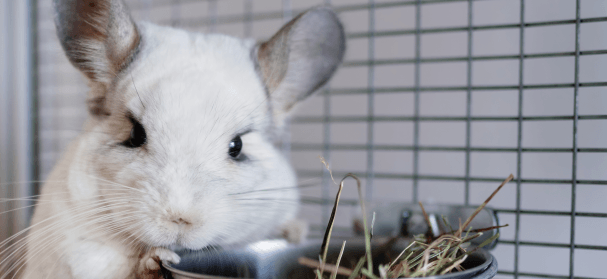CHINCHILLA VET
Chinchilla Veterinarian Serving Akron & Barberton OH
Dr. Riggs is an experienced chinchilla vet with 30 years of experience and practice. We provide complete chinchilla care and are qualified to properly evaluate and treat them. Chinchillas require no shots or vaccinations. However, they are prone to respiratory problems that may need treatment to clear up. Symptoms include: sneezing, coughing, wheezing, labored breathing, runny nose, and ear discharge. In order to keep your chin happy and healthy, we provide the following veterinary services
Chinchilla Wellness Exams
As part of your chinchilla’s wellness examination, we’ll consult with you about your concerns and discuss specific needs of your chinchilla such as diet. We will visually examine teeth, ears, eyes, mouth, and skin for signs of illness. If we find anything abnormal, we may do testing to diagnose possible illness.
Examples of Tests Offered:
- COMPLETE BLOOD COUNT (CBC): A CBC is great laboratory tool that allows a veterinarian to “peek” inside your bird. By assessing the variety of blood parameters we can detect infections, viral diseases, blood parasites, response to disease, and states of anemia to name a few. This test can be done in our office at the time of your bird’s exam to aid in our ability to assess your pet’s health.
- BLOOD PROFILING: A blood profile or serum chemistry series is a group of blood tests used to assess various organ functions or disease states. Kidney function, liver abnormalities, pancreatic disease are but a few of the conditions a blood profile can help evaluate.
- SEROLOGIC TESTING/SPECIFIC DISEASE TESTS:
Serologic tests use a combination of technologies (including state-of-the-art DNA probe tests) to screen your pet for the presence of various contagious diseases. Some examples of common tests used are:
- CHLAMYDIA TESTING: Chlamydia, or parrot fever, is a contagious bacterial disease of birds that is also potentially contagious to humans. A variety of symptoms can be displayed and some birds can be healthy acting carriers. Although a culture is the “gold standard” for testing, a number of different tests are available to use in different situations to screen for this important disease.
- PBFD: Psittacine beak and feather disease is a viral disease capable of infecting a wide variety of bird species. This potentially fatal disease can progress slowly or rapidly and involve a range of feather and beak lesions. Although no cure is currently available, this test can be used to help screen for the presence or absence of this disease in your pet.
- POLYOMA: Polyoma virus is another potentially devastating disease of pet birds that has a variety of presentations and outcomes. Lesions can involve feathers or cause widespread tissue destruction and acute illness. Testing as well as a vaccine is available for this disease.
- PACHECO’S: Pacheco’s disease is a highly infective herpes virus of birds. Disease can be rapid, widespread, and fatal or sporadic with asymptomatic carriers. DNA testing is now available to help detect and prevent this catastrophic disease.
Chinchilla Diagnostic, Therapeutic, and Surgical Procedures
Our goal is to keep your chinchilla healthy and prevent illness. If your pet is injured or ill, rest assured that we have the tools necessary to diagnose the problem and offer state-of-the-art treatment. From blood testing and radiographs to ultrasound and endoscopy, we have the means to track down your chinchillas’ problems. Once the problem is uncovered we have the expertise, equipment, and the years of experience needed to provide the therapy or surgical procedures required to help our patients.

Chinchilla Dental Care
Chinchilla Parasite Control
Like all rodents, chinchilla’s teeth grow continuously their whole lives. Genetic and developmental issues can result in overgrown teeth that can cause potentially fatal health problems. Chinchillas may require molar trimmings if their teeth don’t wear down naturally. Chinchillas need a diet high in coarse food and plenty of safe chewing materials like untreated wood sticks that will help grind their teeth down naturally. If you notice your chin drooling or struggling to eat, he may have a tooth abnormality or excessive growth that needs vet attention.
Chinchilla’s are less prone to fleas and ticks because of their dense fur. However, they can get internal parasites that may cause problems and illness if not treated. We offer internal parasite control medication to keep your chin pest free.
Chinchilla Emergency Care
Our office is open for your chinchilla’s health care needs Monday through Friday 8:00-6:00 and Saturday 8:00-4:00. If emergency care is required after these hours, you can rely on our 24 hour emergency facility- the Metropolitan Veterinary Hospital. Metro is located at 1053 S. Cleveland-Massilon Rd. in Copley (330-666-2976) and is there to assist with any of our client’s problems. At Metro we have veterinarians and technicians on duty 24 hours daily to address your needs. Metro’s staff doctors rotate through our clinic on a regular basis to assure that they are comfortable addressing the problems of our exotic owning clients.




